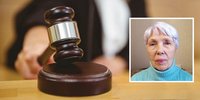The Case of Minenko in Zheleznovodsk
Filter
- #
Pavel Gogolin, senior investigator of the Pyatigorsk Investigation Department of the Stavropol Territory Investigative Committee, is initiating a criminal case against 81-year-old Zinaida Minenko. According to the investigator, the believer, "acting deliberately, together with persons unidentified by the investigation, on a date and time not established by the investigation ... took part in the activities of the LRO of Jehovah's Witnesses in the city of Zheleznovodsk... through interviews to promote its activities, recruit new members, and participate directly in the organization's activities."
- #
In Zheleznovodsk, searches are being carried out at eight addresses, including Zinaida Minenko. The security forces confiscate religious literature, media, electronic devices, documents, as well as jewelry and savings belonging to her.
- #
Senior investigator Gogolin conducts an interrogation of Zinaida Minenko, which lasts 4 hours. The believer declares her desire to use Article 51 of the Constitution and not to testify against herself and her loved ones.
- #
Zinaida Minenko is charged with participation in the activities of an extremist organization. This is how the investigation interprets the peaceful practice of religion. The criminal case is based on the testimony of two women and a man with whom Zinaida discussed Bible teachings.
- #
The investigator acquits the believer of the charge under Part 2 of Article 282.2 of the Criminal Code of the Russian Federation. Criminal prosecution continues on charges of involvement in the activities of an extremist organization (part 1.1 of article 282.2 of the Criminal Code of the Russian Federation).
- #
The investigator charges Zinaida Minenko with committing a crime under part 1.1 of article 282.2 of the Criminal Code of the Russian Federation. A recognizance not to leave and proper behavior is taken from the believer.
- #
The prosecutor approves the indictment.
As evidence of Zinaida Minenko's guilt, the investigation points to recordings of conversations and worship services made during operational-search activities.
The case involves at least two secret witnesses ("Elena Romanova", "Pyotr Petrov"), with whom the believer shared her knowledge of the Bible. Witnesses for the prosecution describe the believer as a calm, polite and cultured woman.
An examination carried out at the North Caucasus Federal University was also attached to the case. Experts conclude that the recordings of the ORM depict divine services and personal conversations about the Bible. At the same time, experts interpret these discussions as "studying the basics of the religion of the LRO "Jehovah's Witnesses"", thereby substituting legal and religious concepts.
The investigator does not consider either the believer's disability or her advanced age to be mitigating circumstances.
- #
The case goes to the Zheleznovodsk City Court. It will be considered by Stanislav Bobrovsky.
- #
45 people come to the courthouse to support the believer. The preliminary hearing is held behind closed doors. The court grants the request for the admission of a public defender. The defense also requests that the case be returned to the prosecutor.
- #
The court refuses to return the case to the prosecutor.
- #
The prosecutor reads out the indictment. After that, Zinaida Minenko speaks with an attitude to the charges. She does not admit guilt and declares that she did not commit illegal acts, is one of Jehovah's Witnesses and adheres to Bible teachings, which she talked about with people. She also recalls that the right to share her beliefs is guaranteed to her by Article 28 of the Constitution of the Russian Federation.
Due to the defendant's hearing problems, the judge asks the prosecutor to speak louder, to which he and other participants in the process react with understanding.
- #
The court proceeds to the examination of prosecution witnesses. The first witness says that she is friends with Zinaida and is interested in the Bible. She says that on her own initiative she came to the believer to discuss the Bible. The woman is sure that Minenko did not commit anything illegal.
Three other witnesses say they learned in 2007 that Zinaida was one of Jehovah's Witnesses. They state that all other testimonies during the investigation were given on the basis of rumors and assumptions. At the same time, witnesses admit that Minenko did not impose anything on them and did not offer religious literature.
- #
A secret witness under the pseudonym Elena Romanova is being interrogated. She says that she herself came to the defendant for Bible studies. The woman admits that Zinaida never encouraged her to hate, but, on the contrary, taught her to treat other people with love.
- #
About 30 people come to the courthouse to support the believer.
A secret witness under the pseudonym Pyotr Petrov is interrogated. He informs the court that Zinaida Minenko told him about the Bible teachings followed by Jehovah's Witnesses, interpreting this as an offer to join a religious organization.
- #
Outside the courthouse there are about 50 people who came to support Zinaida Minenko, but the judge allows only five to pass.
The assistant prosecutor shall read out the inspection report. In the process of reading, he voices the name of God incorrectly, and the defense clarifies what is correct - Jacob. The state prosecutor is being corrected. At the end of the meeting, Zinaida shakes his hand as a token of gratitude for his respect for the feelings of believers.
- #
Acquaintance with the case materials is underway. From 15 to 60 people gather outside the courthouse to support the believer, but only five to ten listeners are allowed into the courtroom.
- #
The study of the case materials from the 5th volume (indictment) continues. During the announcement, the judge interrupts the prosecutor. He wonders what conversations on everyday topics have to do with the accusation. The judge asks the prosecutor to read out the materials selectively, without touching on "conversations on communal issues," since, according to him, the third meeting "hears only about this."
- #
Over the course of 15 sessions, the court examines the case materials: audio recordings, a protocol of inspection of items seized during the search, acts of examination of CDs and the conclusion of specialists.
Zinaida Minenko describes her attitude to the difficulties associated with the need to appear regularly in court as follows: "I feel how God supports me and helps me to endure everything."
- #
Meetings shall resume after a two-month hiatus. The court examines material evidence - audio recordings of conversations between Zinaida Minenko and people on the topics: "Who is God?", "How to get to know God?", "What is his name?", "What does the name of God mean, Jehovah?".
- #
To be published later.
- #
The prosecutor requests for 83-year-old Zinaida Minenko a sentence of 5 years of suspended imprisonment with a probationary period of 5 years and restriction of liberty for a period of 1 year.
About 55 people gather outside the courthouse, 10 of them are allowed into the courtroom.
- #

